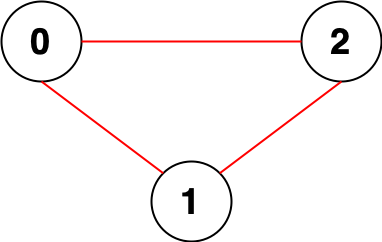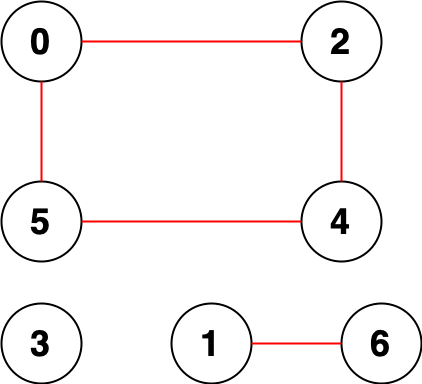You are given an integer n. There is an undirected graph with n nodes, numbered from 0 to n - 1. You are given a 2D integer array edges where edges[i] = [ai, bi] denotes that there exists an undirected edge connecting nodes ai and bi.
Return the number of pairs of different nodes that are unreachable from each other.
Example 1:
Input: n = 3, edges = [[0,1],[0,2],[1,2]] Output: 0 Explanation: There are no pairs of nodes that are unreachable from each other. Therefore, we return 0.
Example 2:
Input: n = 7, edges = [[0,2],[0,5],[2,4],[1,6],[5,4]] Output: 14 Explanation: There are 14 pairs of nodes that are unreachable from each other: [[0,1],[0,3],[0,6],[1,2],[1,3],[1,4],[1,5],[2,3],[2,6],[3,4],[3,5],[3,6],[4,6],[5,6]]. Therefore, we return 14.
Constraints:
1 <= n <= 1050 <= edges.length <= 2 * 105edges[i].length == 20 <= ai, bi < nai != bi- There are no repeated edges.
Companies: Amazon
Related Topics:
Depth-First Search, Breadth-First Search, Union Find, Graph
Similar Questions:
// OJ: https://leetcode.com/problems/count-unreachable-pairs-of-nodes-in-an-undirected-graph
// Author: github.com/lzl124631x
// Time: O(NlogN * K^2) where K is the number of unique graph component sizes
// Space: O(N)
class UnionFind {
vector<int> id, size;
public:
UnionFind(int N) : id(N), size(N, 1) {
iota(begin(id), end(id), 0);
}
int find(int a) {
return id[a] == a ? a : (id[a] = find(id[a]));
}
void connect(int a, int b) {
int p = find(a), q = find(b);
if (p == q) return;
id[q] = p;
size[p] += size[q];
}
int getSize(int a) {
return size[find(a)];
}
};
class Solution {
public:
long long countPairs(int n, vector<vector<int>>& E) {
UnionFind uf(n);
for (auto &e : E) uf.connect(e[0], e[1]);
unordered_set<int> seen;
long long ans = 0;
unordered_map<int, int> cnt;
for (int i = 0; i < n; ++i) {
int r = uf.find(i);
if (seen.count(r)) continue;
seen.insert(r);
cnt[uf.getSize(r)]++;
}
for (auto a = cnt.begin(); a != cnt.end(); ++a) {
long long sa = a->first, ca = a->second;
ans += sa * sa * ca * (ca - 1) / 2;
for (auto b = next(a); b != cnt.end(); ++b) {
long long sb = b->first, cb = b->second;
ans += sa * sb * ca * cb;
}
}
return ans;
}
};
